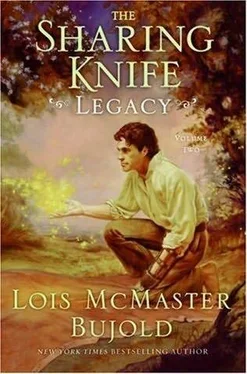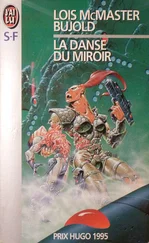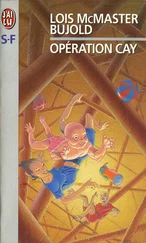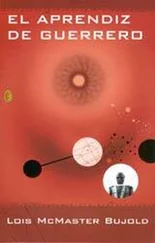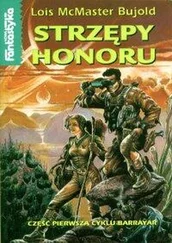“That’s why I’m going to Dar first. Or at all.”
Fairbolt started to hand the knife back to Dag but, at Dag’s gesture, returned it to Fawn. She put the cord back over her head and hid the sheath away again between her breasts.
Fairbolt, almost eye to eye with her, watched this coolly. “That knife doesn’t make you some sort of honorary Lakewalker, you know, girl.”
Dag frowned. But before he could say anything, Fawn, despite the heat flushing through her, replied calmly, “I know that, sir.” She leaned in toward him, and deepened her voice. “I’m a farmer girl and proud of it, and if that’s good enough for Dag, the rest of you can go jump in your lake. Just so you know this thing I have slung around my neck wasn’t an honorary death.” She nodded curtly and stood straight.
A little to her surprise, he did not grow offended, merely thoughtful, if that was what rubbing his lips that way signified. He stood up with a grunt that reminded her of a tired Dag, and strode across the room to the far side of the fireplace.
Covering the whole surface between the chimney stone and the outer wall and nearly floor to ceiling was a panel made of some very soft wood. It was painted with a large grid pattern, each marked with a place name. Fawn realized, looking at the names she recognized, that it was a sort of map, if lines on a map could be pulled about and squared off, of parts of the hinterland—all the parts, she suspected. To the left-hand side was a separate column of squares, labeled Two Bridge Island, Heron Island, Beaver Sigh, Bearsford, and Sick List. And, above them all, a smaller circle in red paint labeled Missing.
About a third of the squares had hard wooden pegs stuck in them. Most of them were in groups of sixteen to twenty-five, and Fawn realized she was looking at patrols—some squares were full of little holes as though they might have been lately emptied. Each peg had a name inked onto the side in tiny, meticulous writing, and a number on its end. Some of the pegs had wooden buttons, like coins with holes bored in the middle, hung on them by twisted wires, one or two or sometimes more threaded in a stack. The buttons, too, were numbered.
“Oh!” she said in surprise. “These are all your patrollers!” There must have been five or six hundred pegs in all. She leaned closer to search for names she recognized.
Fairbolt raised his brows. “That’s right. A patrol leader can keep a patrol in mind, but once you get to be a company or camp captain, well, one head can’t hold them all. Or at least, mine can’t.”
“That’s clever! You can see everything all at once, pretty nearly.” She realized she needed to look more closely at Two Bridge Island for names. “Ah, there’s Mari. And Razi and Utau, they’re home with Sarri, oh good. Where’s Dirla?”
“Beaver Sigh,” said Dag, watching her pore over the display. “That’s another island.”
“Mm? Oh, yes, there she is, too. I hope she’s happy. Does she have a regular sweetheart? Or sweethearts? What are the little buttons for?”
Mari answered. “For the patrollers who are carrying sharing knives. Not everyone has one, but every patrol that goes out needs to have two or more.”
“Oh. Yes, that makes sense. Because it wouldn’t do a bit of good to find a malice and have no knife on hand. And you might find another malice, after. Or have an accident.” Dag had spoken with a shudder of the ignominy of accidentally breaking a sharing knife, and now she understood. She hesitated, thinking of her own spectacular, if peculiar, sharing knife accident. “Why are they numbered?”
Dag said, “The camp captain keeps a book with records of the owners and donors, for if a knife is used. To send the acknowledgments to the kinfolk, or know where to send the pieces if they chance to be recovered.”
Fawn frowned. “Is that why the patrollers are numbered, too?”
“Very like. There’s another set of books with all the names and next of kin, and other details someone might want to know about any particular patroller in an emergency. Or when the emergency is over.”
“Mm,” said Fawn, her frown deepening as she pictured this. She set her hands on her hips and peered at the board, imagining all those lives—and deaths—moving over the landscape. “Do you connect the pegs to people’s grounds, like marriage cords? Could you?”
“No,” said Dag.
“Does she always go on like this?” asked Fairbolt. She glanced up to find him staring at her rather as she’d been staring at the patroller board.
“More or less, yes,” said Dag.
“I’m sorry!” Fawn clapped her hand to her mouth in apology. “Did I ask too many questions?”
Fairbolt gave her a funny look. “No.” He reached up and took a peg out of the Missing circle, one of two jutting there. He held it out at arm’s length, squinting briefly at the fine print on the side, and grunted satisfaction. “I suppose this comes off, now.” With surprising delicacy, his thick fingers unwound its wire and teased off one numbered button. The second he frowned at, but twisted back into place. “I never met the Luthlia folks; never got up that way. You be taking care of the honors on this one, Dag?”
“Yes.”
“Good. Thanks.” He held the peg in his palm as if weighing it.
Dag reached up and touched the remaining peg in the red circle. “Still no word of Thel.” It didn’t sound like a question.
“No,” sighed Fairbolt.
“It’s been near two years, Fairbolt,” Mari observed dispassionately. “You could likely take it down.”
“It’s not like the board’s out of room up there, now is it?” Fairbolt sniffed, stared unreadably at Dag, gave the peg in his hand a toss, and bent down and thrust it decisively into the square marked Sick List.
He straightened up and turned back to Dag. “Stop in at the medicine tent. Let me know what they say about the arm. Come see me after you have that talk with Dar.” He made a vague gesture of dismissal, but then added, “Where are you going next?”
“Dar.” Dag added more reluctantly, “Mother.”
Mari snorted. “What are you going to say to Cumbia about that?” She nodded at his arm cord.
Dag shrugged. “What’s to say? I’m not ashamed, I’m not sorry, and I’m not backing down.”
“She’ll spit.”
“Likely.” He smiled grimly. “Want to come watch?”
Mari rolled her eyes. “I think I want to go back out on patrol. Fairbolt, you need volunteers?”
“Always, but not you today. Go along home to Cattagus. Your stray has turned up; you’ve no more excuse to loiter here harassing me.”
“Eh,” she said, whether in agreement or disagreement Fawn could not tell. She cast a vague sort of salute at Fairbolt and Dag, murmured, “Good luck, child,” at Fawn, in a rather-too-ironical voice, and took herself out.
Dag made to follow, but stopped with a look of inquiry when Fairbolt said, “Dag.”
“Sir?”
“Eighteen years ago,” said Fairbolt, “you persuaded me to take a chance on you. I never had cause to regret it.”
Till now? Fawn wondered if he meant to imply.
“I don’t care to defend this in the camp council. See that it doesn’t boil up that high, eh?”
“I’ll try not,” said Dag.
Fairbolt returned a provisional sort of nod, and Fawn followed Dag out.
Missus Captain Crow was gone from the outer room. Outside, the sky had turned a flat gray, the water of the lake a pewter color, and the humidity had become oppressive. As they made their way down the porch steps to where the horses were tied, Dag sighed. “Well. That could have gone worse.”
Fawn recognized her own words tossed back to her, and remembered Dag’s. “Really?”
His lips twitched; it wasn’t much of a smile, but at least it was a real one, and not one of those grimaces with the emphasis on the grim he’d mostly had inside. “Really. Fairbolt could have pulled my peg and chucked it in the fire. Then all my problems would have been not his problems anymore.”
Читать дальше
